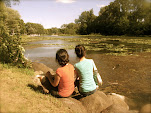饥饿的女儿,青灯,八九点钟的太阳
去燕京图书馆初探的成果是借回来了《八九点钟的太阳》(Morning Sun),北岛的《青灯》还有虹影的《饥饿的女儿》。周末看完了。

 纪录片里出现了很多听说过没听说过的人物。黄永玉一如既往地有范,“挨打也要有挨打的样子,”拿着烟斗出一回神。李锐的眼神非常清亮,谈吐间有一种韧劲。我看着每个革命年代北京大院里成长起来的人,觉得他们之间其实那么像。比如李锐的女儿,就很神似我的Li Jian老师。
纪录片里出现了很多听说过没听说过的人物。黄永玉一如既往地有范,“挨打也要有挨打的样子,”拿着烟斗出一回神。李锐的眼神非常清亮,谈吐间有一种韧劲。我看着每个革命年代北京大院里成长起来的人,觉得他们之间其实那么像。比如李锐的女儿,就很神似我的Li Jian老师。
宋彬彬出现了,疲惫的声音,说,我没有打过人,那些都是谎言,跟我做人的原则完全不相符。徐友渔出现了,回忆七十年代末毛的死去让他想起牛虻目送红衣主教离开的场景,如父如神明的存在就这样灰飞烟灭。遇罗克的弟弟遇罗文出现了。这个人比他哥哥生的俊秀灵动,会回忆当年如何追求女孩。遇罗克本人从照片上看更像个严肃的书呆子。
从《青灯》里看到很多任可之前告诉过我的伯克利系统学术八卦,后悔这次去Davis没有打听北岛的行踪。看到北岛写伯克利南门的“Happy-O-Happy”老爷爷,忽然觉得这个到处去第三世界国家朗诵诗歌,跟各国诗人称兄道弟的人显得亲切起来。然后,觉得“革命”这个话题非常需要仔细思考。

 纪录片里出现了很多听说过没听说过的人物。黄永玉一如既往地有范,“挨打也要有挨打的样子,”拿着烟斗出一回神。李锐的眼神非常清亮,谈吐间有一种韧劲。我看着每个革命年代北京大院里成长起来的人,觉得他们之间其实那么像。比如李锐的女儿,就很神似我的Li Jian老师。
纪录片里出现了很多听说过没听说过的人物。黄永玉一如既往地有范,“挨打也要有挨打的样子,”拿着烟斗出一回神。李锐的眼神非常清亮,谈吐间有一种韧劲。我看着每个革命年代北京大院里成长起来的人,觉得他们之间其实那么像。比如李锐的女儿,就很神似我的Li Jian老师。宋彬彬出现了,疲惫的声音,说,我没有打过人,那些都是谎言,跟我做人的原则完全不相符。徐友渔出现了,回忆七十年代末毛的死去让他想起牛虻目送红衣主教离开的场景,如父如神明的存在就这样灰飞烟灭。遇罗克的弟弟遇罗文出现了。这个人比他哥哥生的俊秀灵动,会回忆当年如何追求女孩。遇罗克本人从照片上看更像个严肃的书呆子。
从《青灯》里看到很多任可之前告诉过我的伯克利系统学术八卦,后悔这次去Davis没有打听北岛的行踪。看到北岛写伯克利南门的“Happy-O-Happy”老爷爷,忽然觉得这个到处去第三世界国家朗诵诗歌,跟各国诗人称兄道弟的人显得亲切起来。然后,觉得“革命”这个话题非常需要仔细思考。
Labels: Literature


